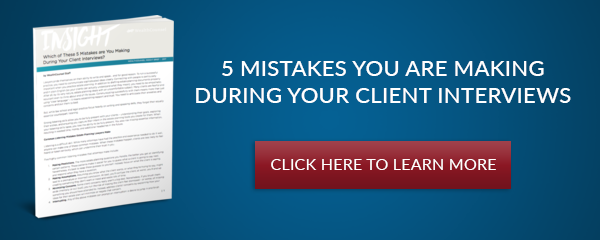 It’s easy to think big picture when setting goals for your estate planning practice. Winning a certain number of new clients or hitting a revenue target are great places to start, but how do you put the steps in place to meet those goals?
It’s easy to think big picture when setting goals for your estate planning practice. Winning a certain number of new clients or hitting a revenue target are great places to start, but how do you put the steps in place to meet those goals?
Cutting out simple errors, connecting with prospects, and staying current on the latest regulations are all individual parts of becoming a more effective and more successful estate planner. The list doesn’t end there. Here are seven habits all effective estate planners share.
1. They are trustworthy
More than half of respondents (53%) to our recent What do Americans Think of Estate Planning survey said it’s difficult to find an advisor they trust to create their estate plan. This mentality is likely rooted in uncertainty about the industry, rather than a justified lack of trust in planners themselves. As an estate planner, you can help change that way of thinking.
Communicate with your clients and get to know their goals so you can act in their best interest. By keeping an open line of communication, you can be more responsive to client concerns and develop action plans to mitigate any potential issues.
2. They educate
Nearly half (46%) of survey respondents said they’re interested in learning more about estate planning. This can be an opportunity for you. Educate prospects through blogs, newsletters, and other content. Tackle introductory topics like ‘why everyone need an estate plan,’ ‘how to select an estate planning attorney,’ and ‘the difference between a will and a trust.’
3. They make connections
Successful estate planning practices regularly add new clients to their business. A strong network of clients, financial advisors, CPAs and fellow estate planning attorneys can be one of your most valuable assets. You can grow that network by joining professional associations, volunteering to present at industry events, and providing referrals of your own. Then, leverage referrals by mastering your “elevator pitch” to help win new clients.
4. They cut out document errors
Few errors indicate an inefficient estate planning attorney like copy and paste or spelling mistakes. Whether you personally draft documents or outsource the task to staff, make sure you have internal processes in place for producing accurate and complete documents. Consider estate planning document software to help:
- Cut down on costly errors
- Streamline your processes
- Produce up-to-date, professional documents
5. They stay up to date on the latest regulations
With the change in administration, legislative changes to estate and income taxes are increasingly likely. One of your responsibilities is to stay up to date with the latest regulations and any changes; but don’t keep the knowledge to yourself:
- Send a newsletter to clients and subscribers if there’s a legal or legislative change
- Advise clients to contact you with any questions
- Reach out proactively to specific clients who might be affected by changes
6. They invest in relationships
You won’t keep clients for long without strong relationships. Look at your clients as human beings, rather than just another component of your business. You need to listen and understand your client’s objectives, and help develop strategies that help them meet their goals.
7. Know they are in the business of practicing law
While it helps to remain aware of the human element of estate planning, unless you operate your practice on a purely pro bono basis, you need to make money. Keep revenue goals in sight and be proactive about marketing your practice to potential leads.
Adopting these habits will not only help you better serve existing clients and form lasting relationships with them — it will also help you attract new clients.
Download our article, Which of These 5 Mistakes are You Making During Your Client Interviews?, to learn more about how to effectively communicate with clients.




